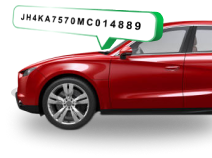North Carolina VIN Check


How to Perform a VIN Lookup in North carolina?
One of the ways people can look up a vehicle’s VIN in NC is through the state’s Department of Motor Vehicles (DMV). The DMV offers resources to help in vehicle identification and history verification. A person can request these details through the mail by filling out the Request for Motor Vehicle Information (MVR-605A) form and sending it to the state DMV. Additionally, individuals can fill out the form and submit it in person to their nearest DMV office. Interested individuals will have to pay a fee depending on the type of vehicle information they require.
People can also use the National Motor Vehicle Title Information System (NMVTIS) database to check North Carolina VIN. NMVTIS database provides information about a vehicle’s title, most recent odometer reading, and condition. The database offers vehicle history information directly from the state’s motor vehicle database.
Lastly, people can use verified online VIN check services like GoodCar to get vehicle details. The website provides detailed information about the car's history, including accidents, title records, odometer readings, and other crucial information. GoodCar also provides a license plate lookup service if individuals cannot access the North Carolina vehicle’s VIN.
Why Should I Run a nc VIN Check?

Whether a person wants to buy a used car or is just curious about the vehicle’s current condition, running a VIN check is a crucial step that an individual should not overlook. Especially in North Carolina, where the used car market is bustling and diverse. A VIN check can provide peace of mind, protect people from potential safety issues, and ensure the vehicle meets the state’s regulations. Some of the common reasons why people should perform a North Carolina VIN check include:
North Carolina's Lemon Laws allow individuals who purchase new vehicles to return them if they fail to meet quality and performance standards. If a new car has a substantial defect even after repair attempts, the manufacturer must replace the vehicle or refund the purchase price. However, it is essential to note that the NC Lemon Law only applies to new cars less than 24 months old or less than 24,000 miles. A VIN lookup can reveal if a car has been previously classified as a lemon.
Why Choose GoodCar for North Carolina VIN Lookup?
Requesters can benefit from extensive vehicle records and reports as they obtain information from accredited data providers like the NMVTIS. GoodCar also illustrates theft checks, collision records, recalls, flood, hail, or fire damage, and pricing.
North Carolina Resources
-
Who Issues A Vehicle's Vin Number In North Carolina?
Vehicle manufacturers issue VINs when the vehicles are in production. However, North Carolina provides state-issued VIN numbers to custom-built, rebuilt, or homemade vehicles.
-
How do I verify a VIN in North Carolina?
Individuals looking to verify a North Carolina VIN can request the information from the state’s DMV or use the National Motor Vehicle Title Information System (NMVTIS). Individuals can also use third-party online VIN decoders like GoodCar to verify a car’s identification number.
-
Is it safe to check a North Carolina VIN online?
Yes, interested parties can safely look up VINs online using verified, NMVTIS-approved websites like GoodCar.
-
Do I need a VIN inspection in North Carolina?
In North Carolina, performing a VIN inspection is necessary for various scenarios, including registering out-of-state vehicles, custom-built cars, rebuilt or salvage vehicles, imported vehicles, and correcting title discrepancies.
-
Are North Carolina VIN checks necessary for out-of-state vehicles brought into North Carolina?
Though not mandatory, a VIN check is essential before purchasing a vehicle outside North Carolina. It can provide valuable insight into the vehicle’s history and whether it meets the state’s standards. However, the state does require out-of-state cars to undergo a VIN inspection.
-
What does a North Carolina VIN check reveal?
A VIN check provides comprehensive information about a vehicle’s history. This information includes a vehicle’s specs, title information, accident and damage history, odometer readings, recall information, and theft records.
-
Can you ask for the VIN from a North Carolina seller?
Yes, interested parties looking to buy vehicles in North Carolina can ask sellers and dealers for the VIN to perform a history check.







